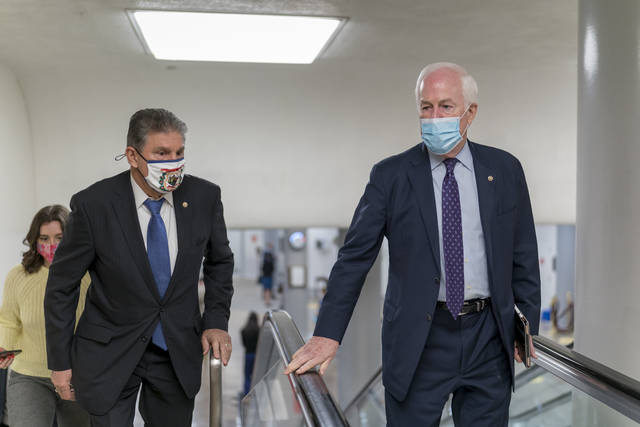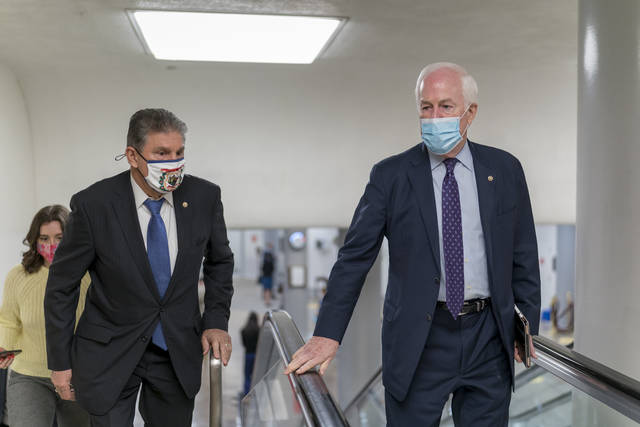

WASHINGTON (AP) — An exhausted Senate narrowly approved a $1.9 trillion COVID-19 relief bill Saturday as President Joe Biden and his Democratic allies notched a victory they called crucial for hoisting the country out of the pandemic and economic doldrums.
After laboring through the night on a mountain of amendments — nearly all from Republicans and rejected — bleary-eyed senators approved the sprawling package on a 50-49 party-line vote. That sets up final congressional approval by the House next week so lawmakers can send it to Biden for his signature.
“We tell the American people, help is on the way,” said Senate Majority Leader Chuck Schumer, D-N.Y. Citing the country’s desire to resume normalcy, he added, “Our job right now is to help our country get from this stormy present to that hopeful future.”
The huge package — its total spending is nearly one-tenth the size of the entire U.S. economy — is Biden’s biggest early priority. It stands as his formula for addressing the deadly virus and a limping economy, twin crises that have afflicted the country for a year.
Saturday’s vote was also a crucial political moment for Biden and Democrats, who need nothing short of party unanimity in a 50-50 Senate they run because of Vice President Kamala Harris’ tiebreaking vote. They also have a a slim 10-vote edge in the House. On Saturday, Sen. Dan Sullivan, R-Alaska, was absent for the vote.
A small but pivotal band of moderate Democrats leveraged changes in the bill that incensed progressives, not making it any easier for Speaker Nancy Pelosi, D-Calif., to guide the measure through the House. But rejection of their first, signature bill was not an option for Democrats, who face two years of trying to run Congress with virtually no room for error.
The bill provides direct payments of up to $1,400 for most Americans, extended emergency unemployment benefits, and vast piles of spending for COVID-19 vaccines and testing, states and cities, schools and ailing industries, along with tax breaks to help lower-earning people, families with children and consumers buying health insurance.
The package faced solid opposition from Republicans, who call the package a wasteful spending spree for Democrats’ liberal allies that ignores recent indications that the pandemic and the economy could be turning the corner.
“The Senate has never spent $2 trillion in a more haphazard way,” said Senate Minority Leader Mitch McConnell, R-Ky. Of Democrats, he said, “Their top priority wasn’t pandemic relief. It was their Washington wish list.”
The Senate commenced a dreaded “vote-a-thon” — a continuous series of votes on amendments — shortly before midnight Friday, and by the end had dispensed with about three dozen. The Senate had been in session since 9 a.m. EST Friday.
Overnight, the chamber was like an experiment in the best techniques for staying awake. Several lawmakers appeared to rest their eyes or doze at their desks, often burying their faces in their hands. At one point, Sen. Brian Schatz, D-Hawaii, at 48 one of the younger senators, trotted into the chamber and did a prolonged stretch.
The measure follows five earlier ones totaling about $4 trillion that Congress has enacted since last spring and comes amid signs of a potential turnaround.
Vaccine supplies are growing, deaths and caseloads have eased but remain frighteningly high, and hiring was surprisingly strong last month, though the economy remains 10 million jobs smaller than its pre-pandemic levels.
The Senate package was delayed repeatedly as Democrats made eleventh-hour changes aimed at balancing demands by their competing moderate and progressive factions.
Work on the bill ground to a halt Friday after an agreement among Democrats on extending emergency jobless benefits seemed to collapse. Nearly 12 hours later, top Democrats and West Virginia Sen. Joe Manchin, perhaps the chamber’s most conservative Democrat, said they had a deal and the Senate approved it on a party-line 50-49 vote.
Under their compromise, $300 weekly emergency unemployment checks — on top of regular state benefits — would be renewed, with a final payment made Oct. 6. There would also be tax breaks on some of those payments, helping people the pandemic abruptly tossed out of jobs and risked tax penalties on the benefits.
The House’s relief bill, largely similar to the Senate’s, provided $400 weekly benefits through August. The current $300 per week payments expire March 14, and Democrats want the bill on Biden’s desk by then to avert a lapse.
Manchin and Republicans have asserted that higher jobless benefits discourage people from returning to work, a rationale most Democrats and many economists reject.
That agreement on jobless benefits wasn’t the only move that showed the sway of moderates.
The Senate voted Friday to eject a House-approved boost in the federal minimum wage to $15 an hour by 2025, a major defeat for progressives. Eight Democrats opposed the increase, suggesting that Sen. Bernie Sanders, I-Vt., and other progressives pledging to continue the effort in coming months will face a difficult fight.
Party leaders also agreed to restrict eligibility for the $1,400 stimulus checks that will go to most Americans. That amount would be gradually reduced until, under the Senate bill, it reaches zero for people earning $80,000 and couples making $160,000. Those amounts were higher in the House version.
Highlights
A look at some highlights of the legislation:
AID TO THE UNEMPLOYED
Expanded unemployment benefits from the federal government would be extended through Sept. 6 at $300 a week. That’s on top of what beneficiaries are getting through their state unemployment insurance program. The first $10,200 of jobless benefits would be non-taxable for households with incomes under $150,000.
Additionally, the measures provides a 100% subsidy of COBRA health insurance premiums to ensure that the laid-off workers can remain on their employer health plans at no cost through the end of September.
MORE CHECKS
The legislation provides a direct payment of $1,400 for a single taxpayer, or $2,800 for a married couple that files jointly, plus $1,400 per dependent. Individuals earning up to $75,000 would get the full amount, as would married couples with incomes up to $150,000.
The size of the check would shrink for those making slightly more, with a hard cut-off at $80,000 for individuals and $160,000 for married couples.
Most Americans will be getting the full amount. The median household income was $68,703 in 2019, according to the U.S. Census Bureau.
MONEY FOR STATE AND LOCAL GOVERNMENTS
The legislation would send $350 billion to state and local governments and tribal governments for costs incurred up until the end of 2024. The bill also requires that small states get at least the amount they received under virus legislation that Congress passed last March.
Many communities have taken hits to their tax base during the pandemic, but the impact varies from state to state and from town to town. Critics say the funding is not appropriately targeted and is far more than necessary with billions of dollars allocated last spring to states and communities still unspent.
AID TO SCHOOLS
The bill calls for about $130 billion in additional help to schools for students in kindergarten through 12th grade. The money would be used to reduce class sizes and modify classrooms to enhance social distancing, install ventilation systems and purchase personal protective equipment. The money could also be used to increase the hiring of nurses and counselors and to provide summer school.
Spending for colleges and universities would be boosted by about $40 billion, with the money used to defray an institution’s pandemic-related expenses and to provide emergency aid to students to cover expenses such as food and housing and computer equipment.
AID TO BUSINESSES
A new program for restaurants and bars hurt by the pandemic would receive $25 billion. The grants provide up to $10 million per company with a limit of $5 million per physical location. The grants can be used to cover payroll, rent, utilities and other operational expenses.
The bill also provides $7.25 billion for the Paycheck Protection Program, a tiny fraction of what was allocated in previous legislation. The bill also allows more non-profits to apply for loans that are designed to help borrowers meet their payroll and operating costs and can potentially be forgiven.
TESTING AND VACCINES
The bill provides $46 billion to expand federal, state and local testing for COVID-19 and to enhance contract tracing capabilities with new investments to expand laboratory capacity and set up mobile testing units. It also contains about $14 billion to speed up the distribution and administration of COVID-19 vaccines across the country.
HEALTH CARE
Parts of the legislation advance longstanding Democratic priorities like increasing coverage under the Obama-era Affordable Care Act. Financial assistance for ACA premiums would become considerably more generous and a greater number of solid middle-class households would qualify. Though the sweetened subsidies last only through the end of 2022, they will lower the cost of coverage and are expected to boost the number of people enrolled.
The measure also dangles more money in front of a dozen states, mainly in the South, that have not yet taken up the Medicaid expansion that is available under the ACA to cover more low-income adults. Whether such a sweetener would be enough to start wearing down longstanding Republican opposition to Medicaid expansion is uncertain.
BIGGER TAX BREAKS FOR HOUSEHOLDS WITH AND WITHOUT KIDS
Under current law, most taxpayers can reduce their federal income tax bill by up to $2,000 per child. In a significant change, the bill would increase the tax break to $3,000 for every child age 6 to 17 and $3,600 for every child under the age of 6.
The legislation also calls for the payments to be delivered monthly instead of in a lump sum. If the secretary of the Treasury determines that isn’t feasible, then the payments are to be made as frequently as possible.
Families would get the full credit regardless of how little they make in a year, leading to criticism that the changes would serve as a disincentive to work. Add in the $1,400 checks and other items in the proposal, and the legislation would reduce the number of children living in poverty by more than half, according to the Center on Poverty and Social Policy at Columbia University.
The bill also significantly expands the Earned Income Tax Credit for 2021 by making it available to people without children. The credit for low and moderate-income adults would be worth $543 to $1,502, depending on income and filing status.
RENTAL AND HOMEOWNER ASSISTANCE
The bill provides about $30 billion to help low-income households and the unemployed afford rent and utilities, and to assist the homeless with vouchers and other support. States and tribes would receive an additional $10 billion for homeowners who are struggling with mortgage payments because of the pandemic.


